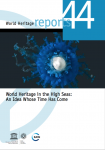The UN Educational, Scientific and Cultural Organization (UNESCO) and the International Union for Conservation of Nature (IUCN) have released a report that explores how world heritage status may be applied to floating rainforests, sunken coral islands and undersea volcanoes in the world's oceans.
The report considers three options for expanding the World Heritage Convention to protect sites situated in marine areas beyond national jurisdiction (ABNJ).
 3 August 2016: The UN Educational, Scientific and Cultural Organization (UNESCO) and the International Union for Conservation of Nature (IUCN) have released a report that explores how world heritage status may be applied to floating rainforests, sunken coral islands and undersea volcanoes in the world’s oceans. The report considers three options for expanding the World Heritage Convention to protect sites situated in marine areas beyond national jurisdiction (ABNJ).
3 August 2016: The UN Educational, Scientific and Cultural Organization (UNESCO) and the International Union for Conservation of Nature (IUCN) have released a report that explores how world heritage status may be applied to floating rainforests, sunken coral islands and undersea volcanoes in the world’s oceans. The report considers three options for expanding the World Heritage Convention to protect sites situated in marine areas beyond national jurisdiction (ABNJ).
‘World Heritage in the High Seas: An Idea Whose Time has Come’ considers five sites, illustrating different ecosystems that are only found under the ocean. The publication underscores the value of these high seas sites alongside the limitations in protecting them from threats such as climate change, pollution, overfishing, deep seabed mining, and navigation. The sites include: the White Shark Café (Pacific Ocean), the only known gathering point for white sharks in the north Pacific; the Costa Rica Thermal Dome (Pacific Ocean), a critical oceanic habitat for marine life, including many endangered species; the Sargasso Sea (Atlantic Ocean), an ecosystem built around a concentration of floating algae; the Lost City Hydrothermal Field (Atlantic Ocean), an 800 meter-deep area with carbonate monoliths up to 60 meters high; and the Atlantis Bank, a sunken fossil island in the Indian Ocean.
Only countries can propose sites for inclusion on the World Heritage List. Because the high seas do not fall under the jurisdiction of any country, sites there cannot be included through the current process, according to the UN. The report discusses efforts currently undertaken to protect ABNJ under the UN Convention on the Law of the Seas (UNCLOS) and the Convention on Biological Diversity (CBD) and examines the legal basis for protection under the World Heritage Convention. It proposes three possible options for applying the outstanding universal value (OUV) concept in ABNJ: a “bold” interpretation of the World Heritage Convention, which would amend the operational guidelines to add a process for designating ABNJ sites; amendment outside the World Heritage Convention; and an optional protocol to the World Heritage Convention.
“The deepest and most remote ocean harbors globally unique places that deserve recognition,” UNESCO’s World Heritage Centre Director, Mechtild Rössler, states in the report’s preface. She underscores that nothing in the Convention suggests that natural or cultural heritage of OUV should be excluded from the World Heritage Convention.
The Khaled bin Sultan Living Oceans Foundation, the French Marine Protected Agency, Jaeger-LeCoultre and the Nekton Foundation provided support for the publication. [UN Press Release] [UNESCO Press Release] [Publication: World Heritage in the High Seas: An Idea Whose Time Has Come]